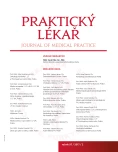-
Medical journals
- Career
Reasons for hospitalization in patients diagnosed from the schizophrenia, schizotypal and delusional disorders
Authors: R. Pastorková 1; L. Juríčková 1; B. Nechanská 2,3,4
Authors‘ workplace: Ústav sociálního lékařství a veřejného zdravotnictví LF UP, Olomouc Přednosta pověřený vedením ústavu: PhDr. Miloslav Klugar, Ph. D. 1; Ústav zdravotnických informací a statistiky ČR, Praha Ředitel: doc. RNDr. Ladislav Dušek, Ph. D. 2; Národní ústav duševního zdraví Ředitel: prof. MUDr. Cyril Höschl, DrSc. FRCPsych 3; Klinika adiktologie, 1. LF UK a VFN, Praha Přednosta: prof. PhDr. Michal Miovský, Ph. D. 4
Published in: Prakt. Lék. 2017; 97(2): 61-66
Category: Of different specialties
Overview
The article addresses the issue of hospitalization of patients with diagnoses of schizophrenia, F20–F29, with a focus on indications for admission, method and type of admission and the total number of hospitalizations. Numbers of the so-called involuntary hospitalization, i.e. detentions, referring doctors, and the reasons that led to hospitalization were recorded. At the same time, a comparison over time and comparison of gender was performed, to determine the differences between the numbers and the indications for hospitalization among men and women in the 2010–2014 period. The authors point out the specifics resulting from the nature of the diagnoses examined and in particular the need for teamwork between doctors of different specialties. The results show that the percentage of urgent admissions constitutes a significant part of all hospital admissions. Another interesting fact is the increase in the number of urgent admissions. In all years, the prevailing reason for treatment was therapeutic, while social reasons accounted for the minimum number of hospitalizations. Prophylactic treatment showed a stationary character in the number of hospitalizations for all reporting periods. A higher proportion of hospitalizations for compulsory treatment was recorded in men who had the reason for admission approximately 5 times more often than women. From the indications for hospitalization of about 40% is another recommendation of the attending physician, general practitioner indicates hospitalization at 3% of the total, and in 20–25% is the translation between inpatient departments. However, it is quite interesting to note that around 16% of the share of the admission without a doctor's recommendation. Given the demonstrated increase in urgent admission of the role of health care practitioners with specialized qualifications in general medical practice for these patients from the above diagnoses will increase. For this reason, the author considers communication as necessary to ensure ongoing awareness of primary care physicians not only in diagnosis and medical care for these patients, but also in the area currently valid legislation and statutory provisions.
KEYWORDS:
schizophrenia – hospitalization – reasons – indication – gender differences
Sources
1. Citrome L, Yeomans D. Do guidelines for severe mental illness promote physical health and well-being? J Psychopharmacol 2005; 19(6 Suppl): 102–109.
2. de Hert M, Cohen D, Bobes J, et al. Physical illness in patients with severe mental disorders. II. Barriers to care, monitoring and treatment guidelines, plus recommendations at the system and individual level. World Psychiatry 2011; 10(2): 138–151.
3. Dickerson FB, Brown CH, Daumit GL, et al. Health status of individuals with serious mental illness. Schizophr Bull 2006; 32(3): 584–589.
4. Faltus F, Janečková E, Anders M. Vývoj psychiatrické péče v ČR. Čes a slov Psychiat 2010; 106(6): 366–371.
5. Gordis I. Epidemiology. 2nd ed. Philadelphia: W. B. Saunders Company 2000.
6. Janssen EM, McGinty EE, Azrin ST, et al. Review of the evidence: prevalence of medical conditions in the United States population with serious mental illness. Gen Hosp Psychiatry 2015; 37(3): 199–222.
7. Juríčková L, Ivanová K, Filka J. Opatrovnictví osob s duševní poruchou. Praha: Grada Publishing 2014.
8. ČTK. Pardubické hejtmanství chce rozvíjet psychiatrickou péči v kraji. Zdravotnictví a medicína 16. 9. 2015 [online]. Dostupný z: http://zdravi.euro.cz/clanek/sestra/pardubicke-hejtmanstvi-chce-rozvijet-psychiatrickou-peci-v-kraji-479842?category=z-domova [cit. 2016-10-19].
9. Pastorková R, Juríčková L. Specifika přístupu zdravotní a posudkové péče u osob zbavených způsobilosti k právním úkonům. Prakt. Lék. 2014; 94 (4): 201–204.
10. OSN. Úmluva o právech osob se zdravotním postižením [online]. Dostupné z: http://www.mpsv.cz/files/clanky/10774/umluva_CJ_rev.pdf. [cit. 2017-01-18].
11. Slováková A, Španiel F, Bankovská Motlová L. Prognóza schizofrenie. Psychiatrie 2015; 19(3): 153–161.
12. Zákon č. 372/2011, Sb., o zdravotních službách, ve znění pozdějších předpisů, ze dne 6. listopadu 2011 [online]. Dostupné z: http://portal.gov.cz/app/zakony/zakon.jsp?page=0&fulltext=&nr=372~2F2011&part=&name=&rpp=15 [cit. 2016-10-19].
13. Zákon č. 89/2012, Sb., občanský zákoník, ve znění pozdějších předpisů, ze dne 6. listopadu 2012 [online]. Dostupné z: http://portal.gov.cz/app/zakony/zakon.jsp?page=0&fulltext=&nr=89~2F2012&part=&name=&rpp=15 [cit. 2016-10-19].
14. Zdraví 2020 – Národní strategie ochrany a podpory zdraví a prevence nemocí [online]. Dostupné z: http://www.mzcr.cz/verejne/dokumenty/zdravi-2020-narodni-strategie-ochrany-a-podpory-zdravi-a-prevence-nemoci_8690_3016_5.html [cit. 2016-10-19].
Labels
General practitioner for children and adolescents General practitioner for adults
Article was published inGeneral Practitioner

2017 Issue 2-
All articles in this issue
- Firearm license – a summary of changes in the assessment of medical fitness of applicants
-
Zdravotní stav zaměstnanců v automobilovém průmyslu
– pilotní studie - Reasons for hospitalization in patients diagnosed from the schizophrenia, schizotypal and delusional disorders
- Health status of foreigners registered at general practitioners in Ostrava
- Optical coherence tomography application in diagnostics and monitoring of idiopathic intracranial hypertension patients
- Changes in dietary habits among adolescents in relation to body weight (HBSC 2002–2014)
- The practical application of clinical criteria for the recognition of the disease of the lumbar spine from overloading as an occupational disease
- General Practitioner
- Journal archive
- Current issue
- Online only
- About the journal
Most read in this issue- Firearm license – a summary of changes in the assessment of medical fitness of applicants
- Reasons for hospitalization in patients diagnosed from the schizophrenia, schizotypal and delusional disorders
- The practical application of clinical criteria for the recognition of the disease of the lumbar spine from overloading as an occupational disease
- Optical coherence tomography application in diagnostics and monitoring of idiopathic intracranial hypertension patients
Login#ADS_BOTTOM_SCRIPTS#Forgotten passwordEnter the email address that you registered with. We will send you instructions on how to set a new password.
- Career

